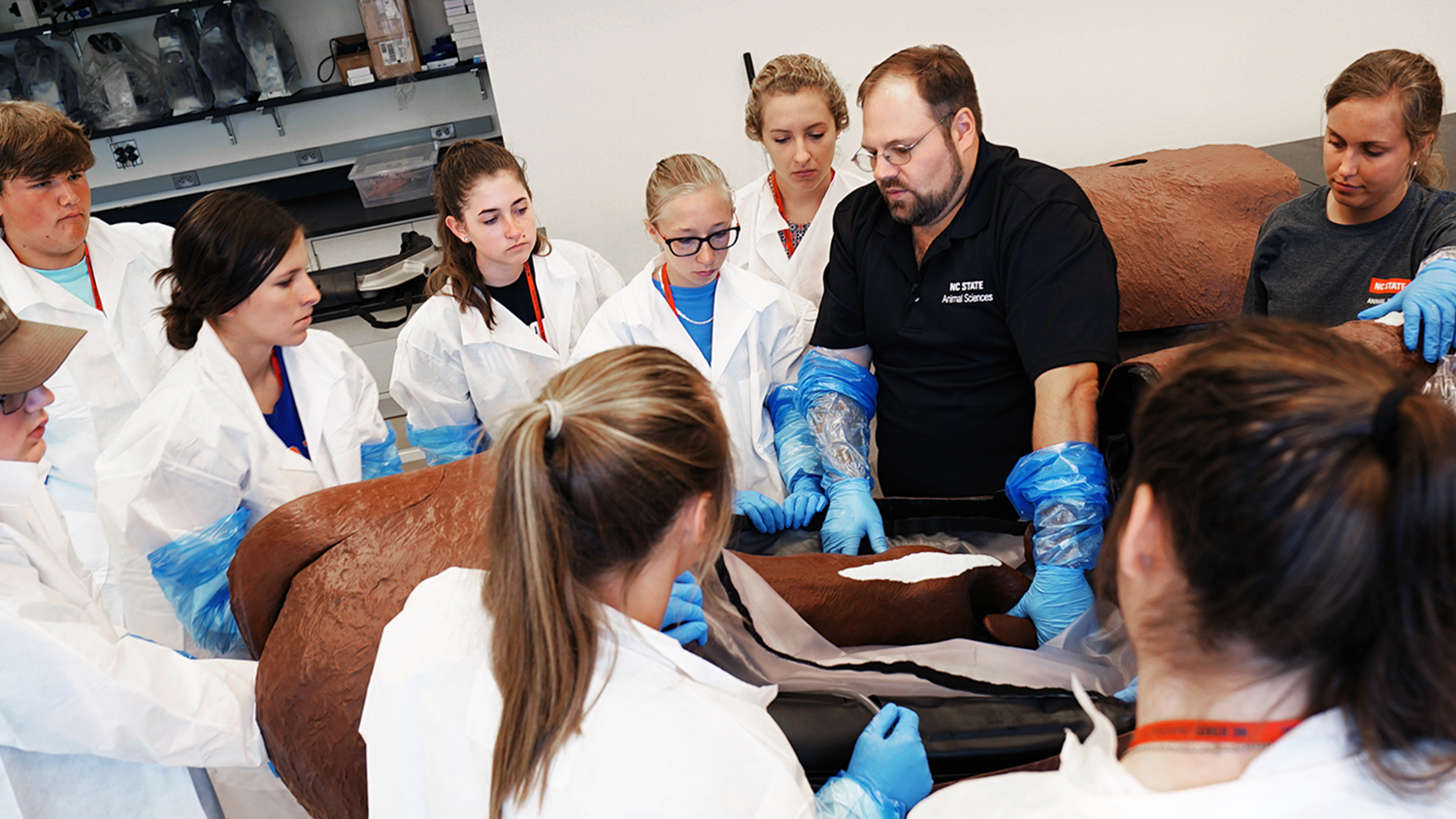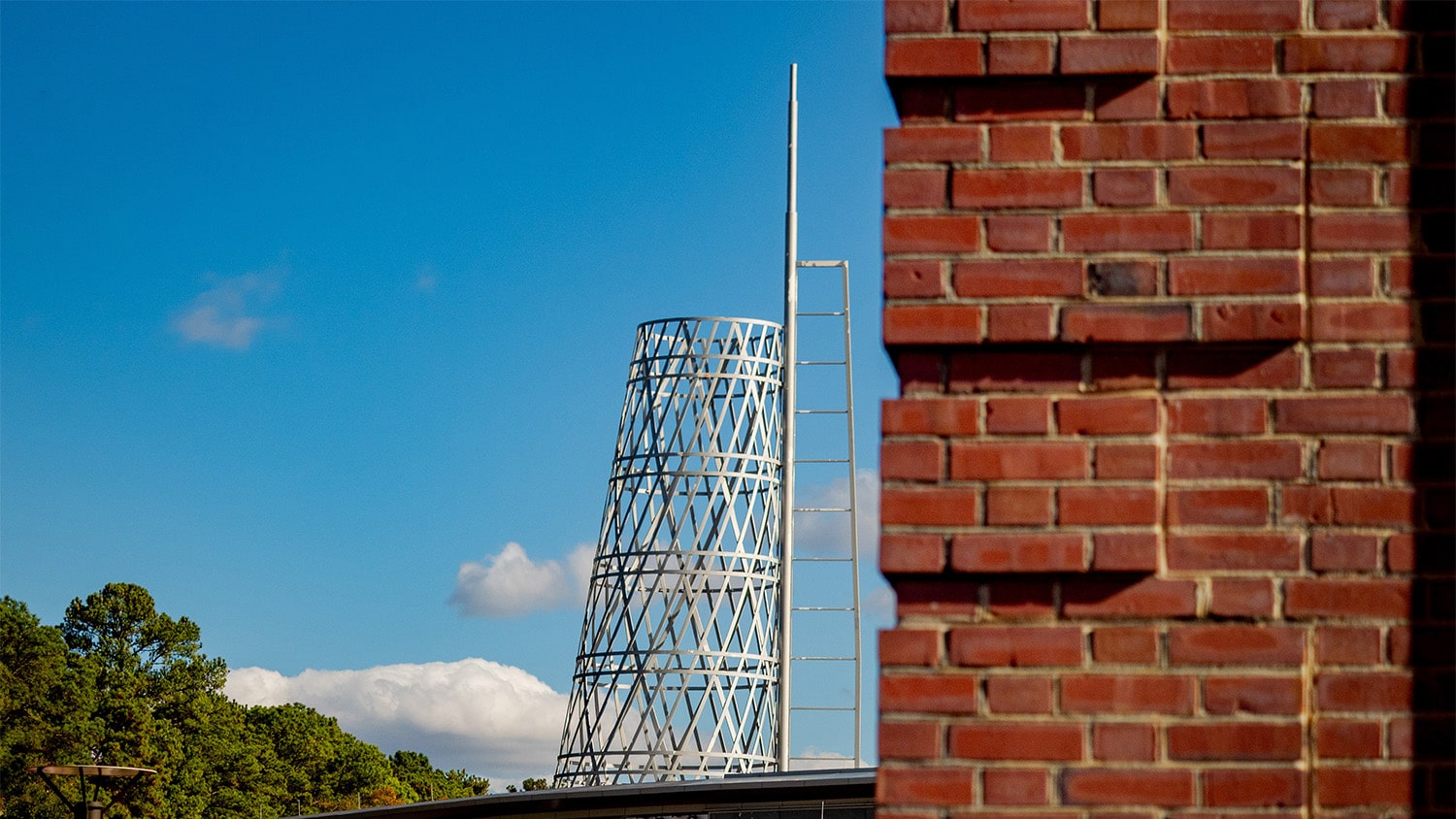Video by Chris Liotta
On the last day of NC State Livestock Science Camp, Carleigh Gupton, 14, was getting her most hands-on experience yet: up to her elbow in the back of a life-sized model cow, trying with all her might to pull a 75-pound plastic calf right way around for delivery.
Assistant Professor Daniel Poole, surrounded by students in rubber gloves, palpation sleeves and lab coats, watched intently.
“It’s slippery, like ice,” Gupton said.
“Now imagine you’re having to do this lying on your side, in pitch black nighttime and it’s sleeting outside,” Poole told the class. “That’s what it’s like in the real world.”
National Teaching Hero
Poole loves to teach, and it shows: in 2017 alone, he’s nabbed the CALS Outstanding Teaching Award, the University Outstanding Teaching Award and the Educator Award from the North American Colleges and Teachers of Agriculture.
His student nominations paint a clear picture of his style: “Encourages critical thinking.” “Makes us feel welcome and involved.” “Sets the gold standard for university educators.”

“I always joke…that I want to be the female version of Dr. Poole,” former student Lane’ Jackson said. “But it’s 100 percent true.”
In the classroom or the research lab, Poole is energetic and hearty. Ask him about his work and his face lights up. He can fill you in on the ways environmental or management factors like heat stress or endophyte-infected fescue impact growth and reproductive performance in beef and dairy cattle — his research focus — or turn to his brand new model cow with a grin to demonstrate how to correct birth dystocia. When you lift the “lid” on the realistically sculpted heifer’s back, you can see the calf encased in a watertight plastic pouch like a water balloon.
“It allows students to get experience with difficult births before they have to try it with a real calf in the field,” he explained. “Also, I can’t wait to soak one of the students when the cow’s water breaks. Because that’s what happens when you’re out there in real life.”
He pauses, then grins.
“It’s going to be fun.”
“Encouraging and Inspiring”

Before every lab, every exam, every practicum, Poole can be found fielding last-minute questions and explaining tricky course material on the whiteboard in his office or outside his classroom in Riddick Hall. He gives correction “when necessary, but always with respect,” Jackson said.
Animal Science Department Head Todd See praises Poole’s active evaluation of new teaching methods, adapting his courses and assignments to enhance learning and problem-solving skills.
“The result is that his students are better prepared for the challenges following their degree, and have a greater ability to be successful in their careers,” See said.
Rather than launch straight into lecture, Poole starts every class with “Reproduction in the News,” an interactive discussion based on current events. Depending on the week, the conversation could cover anything from changes in federal law to the reproductive cycle of a giraffe.
This helps combat his class’s unfortunate time slot: 8:30 a.m.
“I’ve had students tell me that they hate 8:30 classes, but in mine, they can stay awake,” Poole said. “I take that as a big compliment.”
Poole’s Path
 Poole grew up on a diversified livestock farm in southwestern Pennsylvania. He graduated from high school with the firm conviction that he would become a veterinarian.
Poole grew up on a diversified livestock farm in southwestern Pennsylvania. He graduated from high school with the firm conviction that he would become a veterinarian.
In college, he got hooked on research — “I loved that feeling of gathering greater understanding” — and earned a masters from West Virginia University and a Ph.D. from The Ohio State University, then post-doctoral work at Pennsylvania State University.
But it wasn’t until he came to NC State that he realized how much he loved leading a classroom. His first teaching challenge when he arrived in Raleigh: the vast difference in numbers and background of NC State’s larger, more urban student body.
“It wasn’t so much my teaching style that changed as my analogies,” Poole said. “Now when I give examples, I tie in more companion animals like dogs and cats.”
See calls Poole an “outstanding, committed teacher,” in particular his providing educational programs in cattle reproductive physiology to youth, farmers and Extension agents even though he has no formal Extension appointment.
“Around the department, he’s known for his enthusiasm, collegiality and commitment to not just teaching, but to our entire land grant mission,” See said.
“I’m A Lab Rat At Heart”
Poole’s research program has addressed questions regarding the effects of ergot alkaloids and heat stress on ovarian and uterine blood flow, changes in ovarian function and early embryo development. To improve management practices, his team conducted additional studies to implement strategies like progesterone supplementation or supplemental protein to negate the negative impact on reproductive performance.
“We have developed a better understanding of the physiological changes that occur in cattle to maintain homeostasis under these conditions,” Poole said. “Based on these findings, my lab is currently investigating potential mechanisms of genetic resistance or tolerance to these environmental factors.”
Conducting active, ongoing research adds to Poole’s teaching toolbox. He can pull real-world examples from his research, expose students to practical problems and mentor students on undergraduate research projects.
Inspiring Classroom Presence
When he brings it back around to the classroom, Poole prefers case studies to lecture, providing a scenario and asking students to respond like detectives.
“I put in a lot of info they won’t need, because that’s how it is in the real world — the farmer will tell you 800 things, but only two or three will be what you need to know to figure out what’s going on,” Poole said. “That gets the students to apply what they’re learning so that it really sinks in.”
If a student is struggling, it’s to the whiteboard in his office for some Q-and-A based problem-solving, where Poole and the student will draw, brainstorm and problem-solve, allowing the material to sink in for a variety of learning styles.
“Working with them one-on-one, I get to see how they’re thinking and figure out the best way to teach them,” Poole said.
This post was originally published in College of Agriculture and Life Sciences News.
- Categories:



